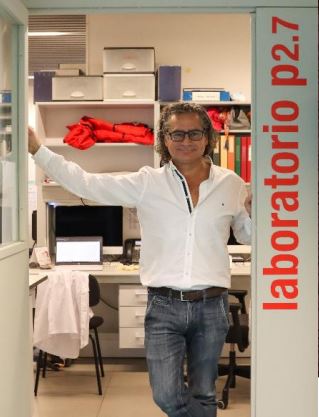SEMINARIO DE INSTITUTO
Metabolic shapes of brain cells and functional consequences
Ponente
Juan Pedro Bolaños
Fecha y hora
8 de abril de 2022 12:30
Lugar
Instituto Cajal
Abstract
Each brain cell type shows a specific metabolic signature that links energy conservation with cell function. For instance, the different relative dependence of astrocytes and neurons on glycolysis or oxidative phosphorylation (OXPHOS) implies that OXPHOS energy efficiency is not identical across all cell types. In a proteomic analysis of mitochondrial proteins isolated from astrocytes and neurons we revealed that mitochondrial complex I (CI) and III (CIII) super-assembly differs. In neurons, CI is more tightly bound to CIII than in astrocytes and determines higher mitochondrial efficiency in neurons. In contrast, the proportion of CI that is not bound to CIII is higher in astrocytes than in neurons, implying lower bioenergetic efficiency but higher mitochondrial ROS production in these glial cells. In this seminar I would like to show results suggesting that tis astrocytic metabolic shape is important for neuronal function and organismal behavior.
Affiliation and short bio

Juan P. Bolaños studied Pharmacy at the University of Salamanca (USAL, Spain), where he also performed the PhD in Biochemistry & Molecular Biology. The he moved to the Institute of Neurology (London, UK) as a Marie Curie Postdoc fellow. He returned to USAL and became lecturer, and then full professor. His is interested in the regulation of the metabolic and redox coupling amongst the brain cells and its impact in behavior and neurological diseases. He identified nitric oxide as a regulator of mitochondrial cytochrome c oxidase, deciphered key signaling pathways regulating glycolysis in astrocytes and neurons and characterized structural features of the mitochondrial respiratory chain in these cells as key factors dictating energy provision for neurotransmission. He described that mitochondrial reactive oxygen species (mROS) in astrocytes are physiological signals that impact on brain metabolism and behavior. He identified, in a collaborative work with G. Marsicano, that cannabinoids, acting on their mitochondrial receptors, regulate astrocytic mitochondrial complex I integrity, mROS production and glucose metabolism affecting sociability. Recently, we found that altered mitophagy in neuronal lipofuscinosis engages an aberrant glycolysis and ROS handling that can be pharmacologically targeted in a model of Batten disease.
